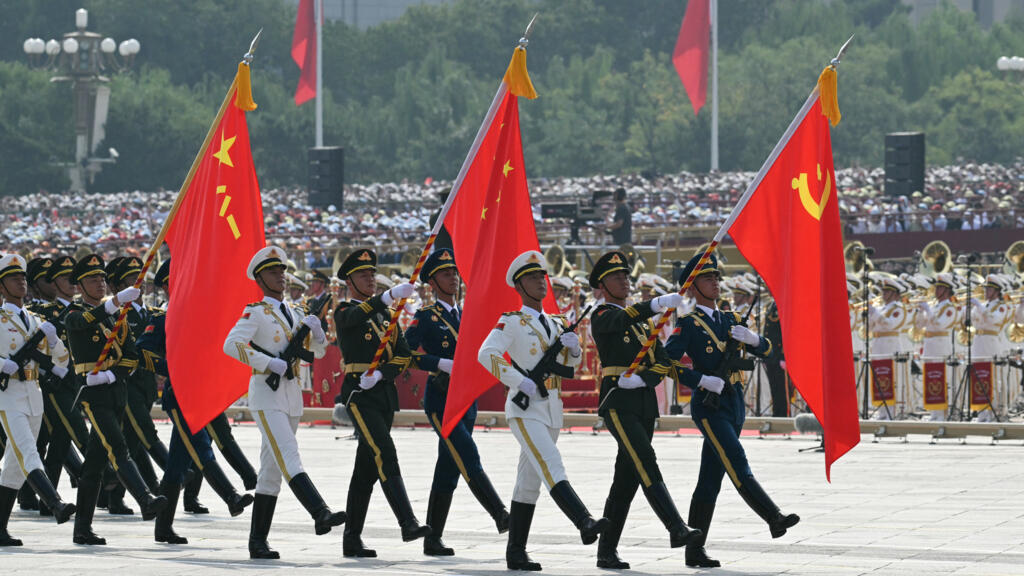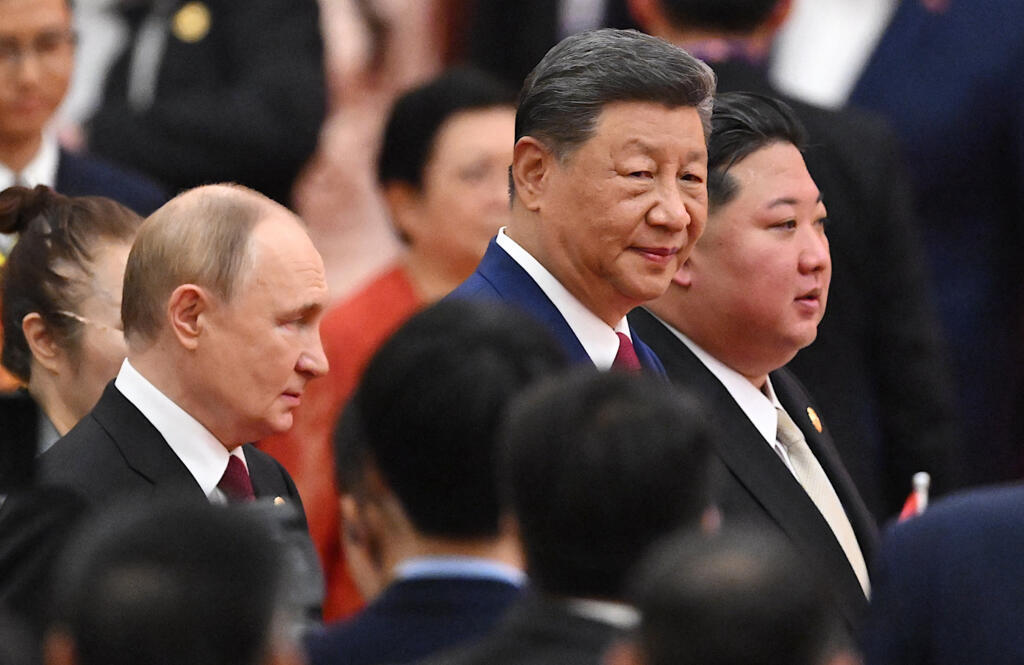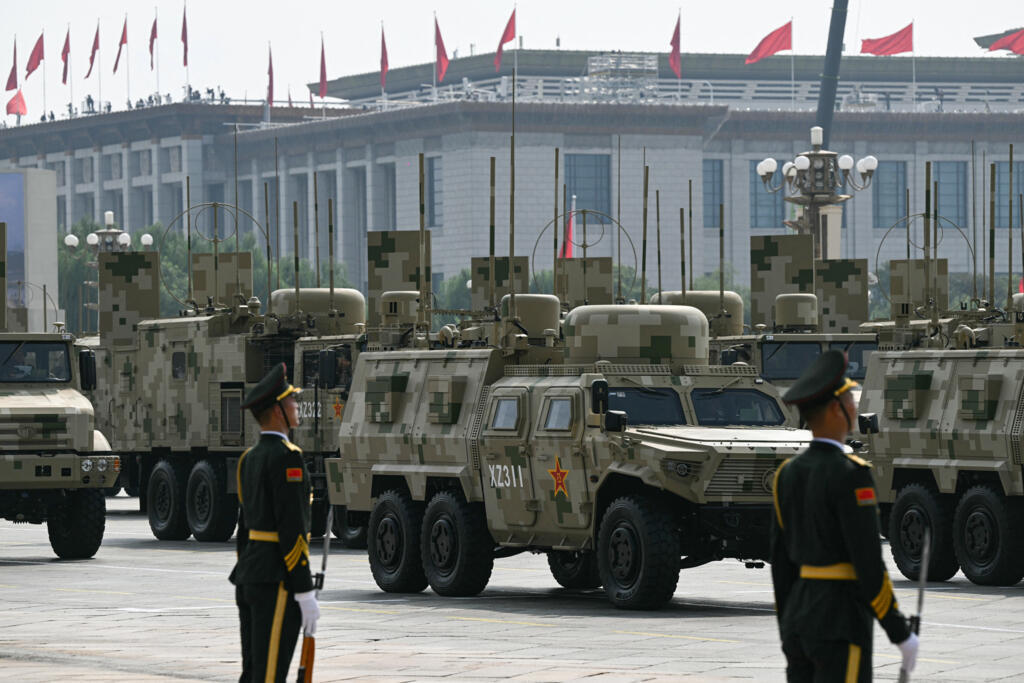
China staged its largest-ever military parade in Beijing on Wednesday to mark 80 years since Japan’s surrender in the Second World War. President Xi Jinping stood in Tiananmen Square flanked by Russian leader Vladimir Putin and North Korea’s Kim Jong-un – a spectacle designed to show military power and political unity against the West.
The three men walked together down a red carpet in unprecedented scenes, Xi shaking their hands before inspecting massed troops and weaponry from an open-top limousine along Beijing’s Chang’an Avenue.
The state broadcast showed tanks, stealth jets, missiles and drones rolling past the tribunes as music and choreography celebrated what China described as an "epic of resistance".
“Our world is still faced with a choice of peace or war,” Xi said. He warned that China was unstoppable.
“The renaissance of the Chinese nation is unstoppable, and the noble cause of the peace and the development of humanity will certainly triumph.”
Symbolic staging
From Beijing, RFI correspondent Clea Broadhurst described Xi’s military review: the Chinese leader “standing in his open-roofed car as he descended the Avenue of Eternal Peace, responding to the martial salute of the troops”.
His position in the stands – between Putin and Kim – carried heavy symbolism. Analysts called it an “axis of autocracies” facing off against the West, saying the carefully calibrated image was intended to resonate both at home and abroad.

For most people, the spectacle played out on TV – in Beijing, residents even crowded into a tiny laundry temporarily turned into a viewing space.
“It is extremely important, it is only when the country is strong that the people can live in peace,” one veteran told RFI from the laundry.
“A military parade is not only a show for the public – it reassures ordinary citizens and inspires the young generation to carry on our mission and build an even better country. As a former fighter, I feel genuine pride from the bottom of my heart.”
An elderly woman said the parade sent a message abroad.
“I think this shows the whole world that China is now strong, that we are very united and that our army is powerful. But this does not mean we want to wage war, it is so everyone knows that we can protect ourselves and that we are not afraid of being bullied.”
A young viewer described feeling inspired.
“I found it quite impressive, especially seeing all those well-organised formations and sophisticated equipment. It gave me the feeling of having a mission, as if I too had to make a contribution to the country. I feel pride and a sense of responsibility.”
Putin and Modi in China for Shanghai Cooperation summit hosted by Xi
Military firepower
The show of force involved around 100,000 soldiers and featured some weapons never before displayed in public.
Chinese military officials said hypersonic missiles capable of striking ships at sea were among the highlights, along with the AJX002 underwater drone and the new DF-61 intercontinental ballistic missile that can carry nuclear warheads to distant targets.
China’s Fujian aircraft carrier, its most advanced yet, may also soon be declared operational – a symbol of how the navy has surpassed the US fleet in numbers of ships since 2020.
State media said the parade included 80 buglers (trumpet players) to mark the years since 1945 and 14 musical groups representing the 14 years of war in the Party’s official version of history.
The People’s Liberation Army has not fought since 1979 and has yet to prove itself in combat. Analysts also point to weaknesses in China’s submarine fleet, which still depends on older diesel models, and to doubts about its command structure after two defence ministers were removed in 2024.

European leaders absent
While some 27 heads of state and government travelled to Beijing, Europe’s presence was almost non-existent. Slovakia’s Prime Minister Robert Fico was the only EU leader in the stands.
Most of his European counterparts – and even many ambassadors – declined their invitations.
Brussels wanted to avoid any image of sharing the platform with Putin, responsible for the war in Ukraine.
At a recent China–EU summit, Council President Antonio Costa and Commission chief Ursula von der Leyen had openly criticised Chinese overproduction and Beijing’s support for Moscow.
The EU accuses China of supplying components that feed into Russia’s war industry.
Whirlwind week for Xi
The parade capped a week of diplomatic manoeuvres for Xi, who had just hosted a Shanghai Cooperation Organisation summit in Tianjin.
`There he railed against “bullying behaviour” – a swipe at the United States – while Putin defended Russia’s invasion of Ukraine.
Kim’s presence was also highly symbolic. It was only his second trip abroad in six years, and the first time he has appeared alongside both Xi and Putin.
US President Donald Trump posted online: “Give my warmest regards to Vladimir Putin, and Kim Jong Un, as you conspire against the United States of America.”







